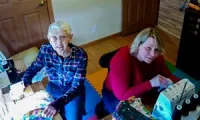
Sandie Chandler was sewing her own handmade outfits at the young age of 12, a skill she learned from her mother. “I was four when my mom gave me a toy sewing kit to occupy my hands while she sewed clothes,” said Chandler.
In the years since, the TSA officer from Montana’s Billings Logan International Airport has sewn her children’s clothes, created beautiful, handmade quilts and developed a passion for needlework.
With such a legacy, it’s not surprising Chandler’s daughter, Serena Williams, a lead technician for sterile central processing at St. Vincent Hospital in Billings, Montana, turned to Chandler in March with an urgent sewing request. Like many hospitals around the country, St. Vincent was having difficulty sourcing surgical caps. Could she make caps for Williams and her frontline coworkers?
“When my daughter voiced concern over the lack of personal protective equipment, I knew I had to step up and do my part as a mother and American,” said Chandler. “I told her, ‘Let me do a little research and I’ll make it happen.’”
Chandler found a surgical scrubs pattern which included a cap design and bought enough washable cotton fabric to make 20 caps. A couple of prototypes rolled off her sewing machine for a test run, and feedback produced two functional styles, affectionately dubbed “bouffant” and “shorty.” The bouffant version allows someone with lots of hair to comfortably secure it under the cap, and the shorty fits a breezier hair style.
With 85 years of sewing wisdom, Chandler’s mother, Dianne Fritch, was also recruited to help. So far, the family has donated over 200 stylish caps to St. Vincent.
Service to others is a family affair. “In my daily work, I strive to protect my coworkers and patients entering the operating room,” said Williams. “While prepping instrument sets for surgery, I always prep them as if a family member will be using it. Helping make surgical caps is a small way I can give back to the amazing community that has helped support me throughout the years.”
Generous community members are now financing the effort with cash and material donations. Fabric choices are tailored based on personalities and fashion preferences, ranging from camouflage to unicorn designs.
Even discarded scraps from the caps are being used to make masks with color-coordinated straps. Other stray pieces find their way into Fritch’s nimble hands, where she cuts and stitches them into a quilt, which will be donated to St. Vincent as a fundraising item.
“We want to say thank you to the medical professionals who put their lives on the line every day and never receive the recognition they deserve,” said Chandler. “We see you, we support you, we love you and we thank you for everything you do.”

